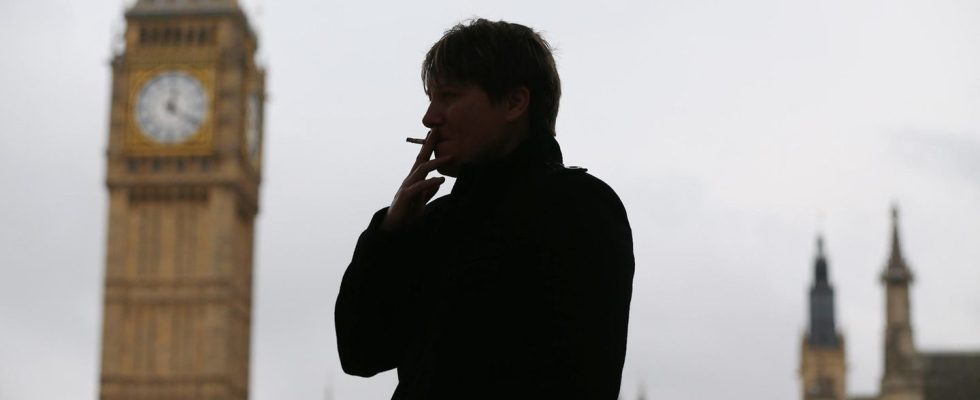Smoke-free by 2030
England declares war on smokers: “Until no one can buy a tobacco product anymore”
The number of smokers in the UK is already falling – but not fast enough to be smoke-free by 2030.
© Carl Court/Getty Images
England wants to be smoke-free by 2030. But experts warn that the goal is clearly being missed. That’s why municipalities are calling for more radical measures.
Winston Churchill is a war winner and Nobel Prize winner for literature – and a bad role model when it comes to the government in London. The British will no longer go through life smoking, as the famous statesman once did, by 2030 at the latest. “Smokefree” is the goal. This means that in the largest part of the UK In England, a maximum of 5 percent of adults still use cigarettes or e-cigarettes. The trend actually looks good. The number of smokers in Great Britain has been falling for years. In 2022 it was still 12.9 percent of adults. That was around 6.4 million people, but significantly fewer than a decade earlier, when 19.6 percent smoked.
But experts warn that the 2030 target will now be clearly missed. A smoke-free England is not expected until 2037 at the earliest, an independent report said last year. Taxes on cigarettes rose significantly again in the spring by more than 12 percent – since then a pack of 20 smoking sticks has cost an average of 14.39 pounds (16.74 euros), around twice as much as in Germany.
“Smoking is a big burden”
But the government is leaving it at that for now, so municipalities are now pushing ahead. Councilors from 16 London boroughs called for smoking to be banned in all seating areas outside pubs and restaurants in a letter to Health Secretary Steve Barclay and Local Government Secretary Michael Gove. “Smoking is a huge burden on many of our most deprived communities, costing our city £3 billion every year in lost economic productivity and health and social care costs,” Jim Dickson, councilor for the Lambeth capital district, told the Sun newspaper. .
A corresponding addition to a law already exists. “There is a clear consensus among the public that outdoor eating and drinking areas should be free from cigarette smoke,” said George Young, who introduced the proposal in the House of Lords. A few local authorities, including the major cities of Manchester and Newcastle, have already implemented the idea because they did not want to wait for a national regulation. According to the Action on Smoking and Health initiative, almost two thirds of people support a ban on smoking in seating areas outside pubs, restaurants and cafes. Smoking has not been allowed inside restaurants since 2007.
If the independent investigation report is anything to go by, the government should take even more radical action. The proposal: The sales age, currently 18, should be increased by twelve months every year “until no one can buy a tobacco product in this country anymore.”
Shocking images before the BGH
Where a pack costs 24 euros and some people smoke 3,000 butts – 14 facts about cigarettes
Exit or gateway drug?
The government has so far relied on initiatives. In April, it announced a “world’s first” pilot project to encourage one million smokers to swap their butts for e-cigarettes. For some experts, the so-called vapes are seen as an introduction to the exit. The 2022 investigation report also emphasizes: “We know that e-cigarettes are not a miracle cure and are not completely risk-free, but the alternative is far worse.” According to Cancer Research UK, 500,000 hospital admissions each year in England are related to smoking. The cost to the economy is therefore: 17 billion pounds per year.
However, the promotion of vapes is primarily aimed at adult smokers. For young people, on the other hand, disposable e-cigarettes, which are often bright and trendy and easy to hide and which look like lipstick, are seen as a gateway drug. Critics are of the opinion that the fruity, sweet vapor, which often contains nicotine, is more likely to target minors.
Soon there will be no disposable e-cigarettes in England
E-cigarettes are “not a risk-free product and are just as addictive, if not more so, than conventional cigarettes,” warns the Royal College of Paediatrics and Child Health. Vapes have become an “epidemic among minors.” In 2022, around 15.5 percent of 16 to 24 year olds vaped, significantly more than the previous year at 11.1 percent.
The warnings have now reached the government. As the Telegraph newspaper reported, disposable e-cigarettes are to be banned. Science Minister Michelle Donelan did not deny the plan. Rather, the conservative politician spoke on Sky News about a very worrying trend. Young people who have never smoked before would start vaping.

